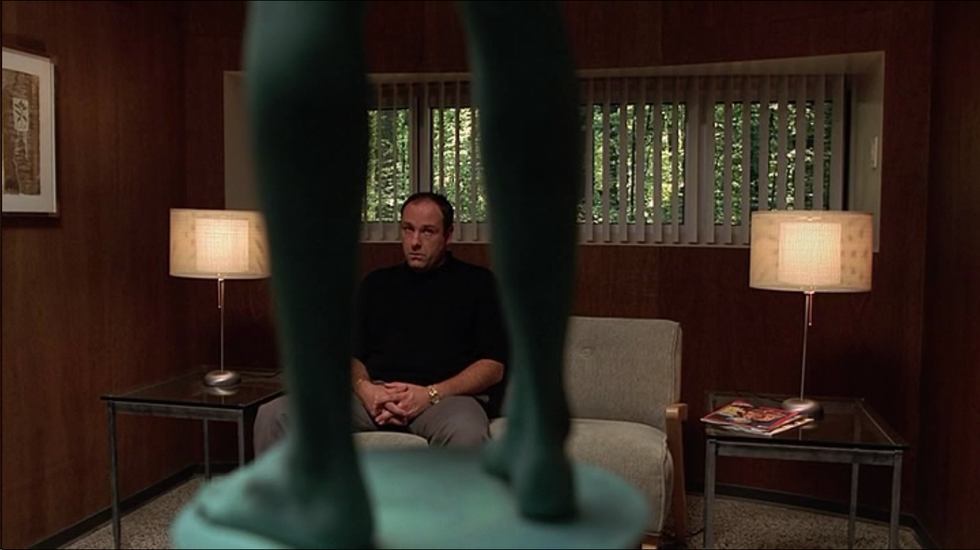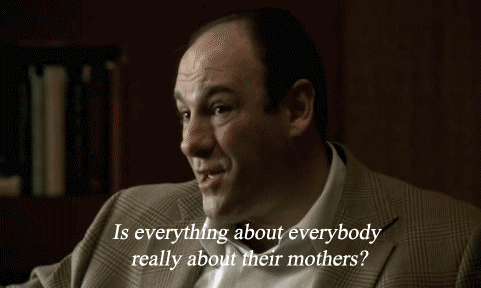Tony Soprano burst onto HBO’s prime time screen in 1999. The New Jersey mobster redefined how we view television and successfully created a new television archetype, the anti-hero. "The Sopranos" also explored existential ideas throughout its six-season run. The show would often exploit the fears of mortality held by many of the show’s chief characters. It depicts a world in which the mafia’s power has been dramatically reduced.
Over the past few weeks, I’ve jumped headfirst into "The Sopranos," and it’s been well worth it.
The pilot episode opens with Tony sitting outside psychiatrist Jennifer Melfi’s office. Confused, Tony stares at an erotic statue, wondering what he's gotten himself into.
Melfi welcomes Tony into her office and shortly thereafter, he describes (and the show cuts to) a scene in the backyard of the Soprano family’s elegant estate. Tony looks out of a window into his yard and sees a group of ducks basking in his pool. Excitedly, the mobster runs into his backyard and follows the ducks into the pool and begins feeding them, much to the chagrin of his wife and daughter.
As the session with Dr. Melfi progresses, Tony tells her that he’s a waste management consultant. At this point, one of the show’s main points of tension emerges: Tony must speak in euphemism about his work and personal life because Dr. Melfi is required, by law, to report any sort of criminal activity her client may engage in/or has engaged in.
Over the course of the first season, Tony’s fraught relationship with his mother takes center stage. Initially, Tony tries to please his mother in any way possible, but fails to do so on numerous occasions. He even tries putting her in a retirement center, but she hates this and identifies it as a way for Tony to separate her from his life.
Age, or the dissatisfaction of the elderly, also features prominently through the show’s first season. Tony’s uncle Carrato “Junior” Soprano, holds a high rank within the mob family, but doesn’t feel like he’s respected. After several meetings with Tony’s mother, she and Junior agree they must “whack” Tony.
Other moments during the show include a curious Anthony, Jr. questioning the meaning of life and the purpose of all things. While he’s often depicted as an airhead on the show, Anthony, Jr., or AJ, actually possesses a natural curiosity that often gets him in trouble. However, the existential issues AJ raises strike at the very core of Tony’s depression.
Towards the end of Tony’s first session with Dr. Melfi, he describes his first panic attack. It occurred during AJ’s birthday party, after hearing that his mother was unable to attend her grandson’s party. Tony watches the ducks return to his pool, attempting to fly. At first, Tony’s elated to see the ducks, but when he realizes they are flying away, his panic attack begins.
“At first, it felt like…ginger ale in my skull,” Tony tells Dr. Melfi, as the screen depicts Tony falling to the ground.
The show is a unique combination of the mafia’s demise and mental health. Tony fears seeing a psychiatrist because of the stigma associated with therapy. He’s afraid he’ll be whacked, or worse, deposed from power.
Ultimately, the show is about a man who realizes he won a position of power in an institution that has been reduced to a shell of its former self:
“I’d been thinking: it’s good to be in a thing from the ground floor. I came too late for that, I know. But lately I’m getting the feeling I might be in at the end. That the best might be over.”
Depression sets in and Tony must confront it. He’s a man of a different time trying to adapt to a changed world that no longer accepts him. Viewers of the show find themselves empathizing with Tony's struggle, despite his despicable actions. He's really television's first anti-hero. Walter White, Omar Little, Dexter Morgan and Frank Underwood all owe their illustrious television careers to the genius of Tony Soprano.






















